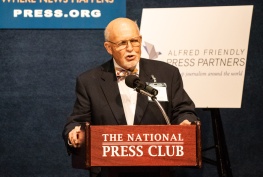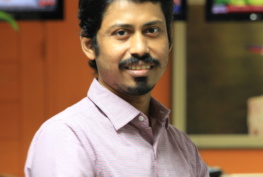Humayoon Babur, a reporter and editor from Afghanistan, is working with international correspondents and his colleagues at the Kabul-based Pasbanan News Agency to describe the deteriorating conditions since the U.S. military’s departure.
Babur, a Daniel Pearl Fellow in 2019, and Hugh Tomlinson, a staff correspondent for The Times, had an article published Wednesday about the Taliban’s crackdown on the media in territory under their control.
The scores of journalists fleeing the Taliban advance confirmed that local newspapers, radio stations and broadcasters have shut down as staff members go underground, terrorized by murders of media workers in recent months.
A few outlets have survived by agreeing to self-censor their work, replacing news reports with Islamic sermons, recitations from the Quran and Taliban-approved bulletins.
For a previous article with Tomlinson in The Times, Britain’s oldest national newspaper, Babur interviewed Afghans about the Afghan army’s retreat. More than a thousand troops fled across the Tajikistan border in the face of Taliban advances.
The Afghan soldiers escaped across a bridge after being routed by the insurgents during clashes in the northern province of Badakhshan. “Most districts in Badakhshan are falling without any fighting,” a resident of Faizabad told Babur.
A few days before leaving his post, Gen. Austin Scott Miller, the commander who masterminded the withdrawal of NATO forces from Afghanistan, expressed alarm at the speed of the Afghan army’s retreat.
The Taliban onslaught came within hours of the last U.S. troops vacating the massive military compound at Bagram airbase, a linchpin of the American war effort during 20 years of conflict.
“The Taliban have cut off all gates out of the city, and there are checkpoints on all the roads, searching for government officials,” a Badakhshan resident said. Those who can have abandoned the city, by air of course.”
Babur has continued to report from the front lines and Pasaban, where he works as an editor, continues to publish.
In this week’s article in The Times on the media, Pasbanan founder Shershah Nawabi said that security was worsening by the day and that most journalists were trying to leave.
Journalism was always a perilous job in Afghanistan. Dozens of journalists have died during the 20-year conflict, and Danish Siddiqui, the award-winning Reuters photojournalist, was killed in a Taliban ambush in southern Kandahar last week.
The Taliban’s wave of murders also has targeted lawyers and professional working women.
Babur worked with Tomlinson on a story about ISIS attacks targeting female journalists and the murder of two female supreme court judges in Kabul earlier this year, part of an increasingly vicious campaign to eradicate Afghanistan’s educated middle classes. (Babur approved the use of his stories in our newsletter)
Babur improved his journalistic skills and English language abilities during the fellowship while working at the Pittsburgh Post-Gazette and Park Point University’s Center for Media Innovation, which improved his chances of landing freelance work with international publications.
Babur co-authored a story published in the Pacific Council magazine earlier this year about the wave of violence targeting women as the United States was contemplating withdrawal from Afghanistan. Many courageous Afghan women have paid the ultimate sacrifice while striving for a better future for their country, he wrote.
Not all of Babur’s articles focus on the fighting. In another collaboration for the Pacific Council magazine, he wrote about the completion of a dam across the Helmand River on the Afghan-Iran border in Nimruz province in February.
One of his interview subjects lives on the outskirts of Zaranj, the capital city of Nimruz, where nearly half of all residents face a shortage of potable water and agriculture.
Humayoon Babur is one of many journalists whose careers have been transformed by their experiences during the Alfred Friendly Fellowships, and their impact broadened. Please take a minute to contribute to our organization so we can continue training promising young reporters from Afghanistan and other areas of the world that need high-quality reporting.
Alfred Friendly’s Class of 2019 gathered during their training at the Missouri School of Journalism.




